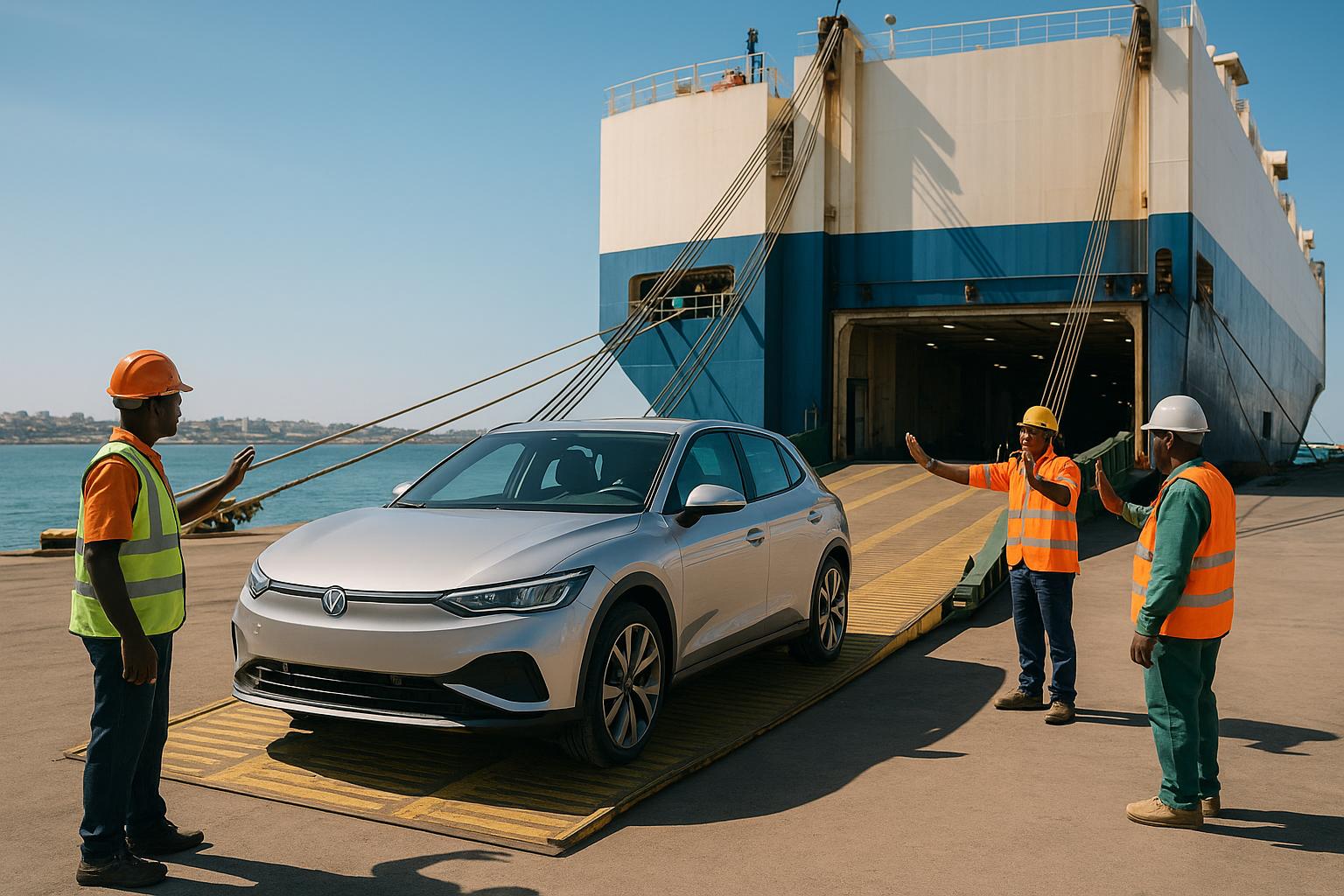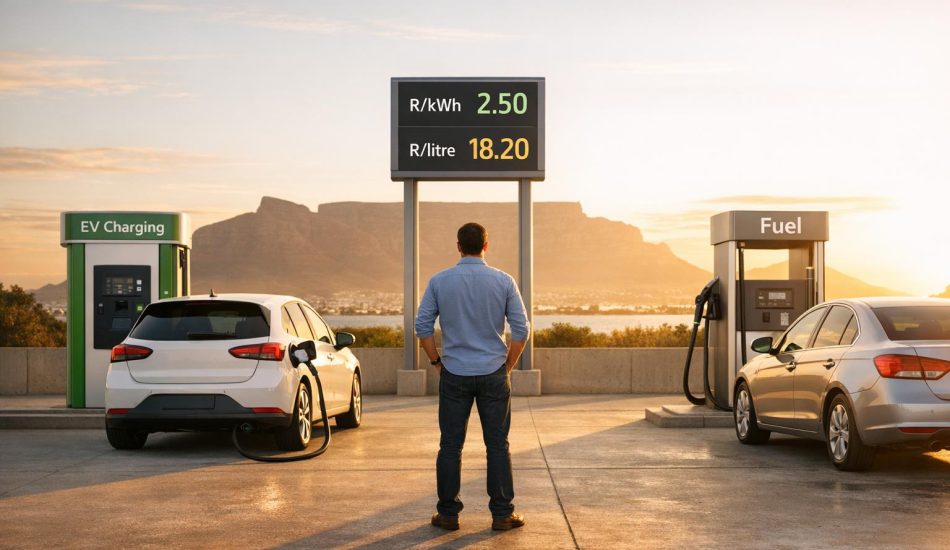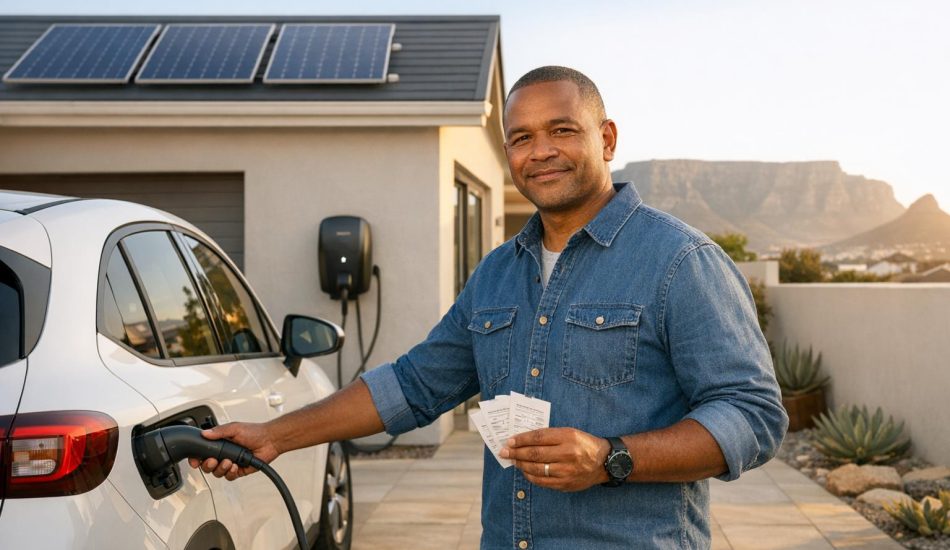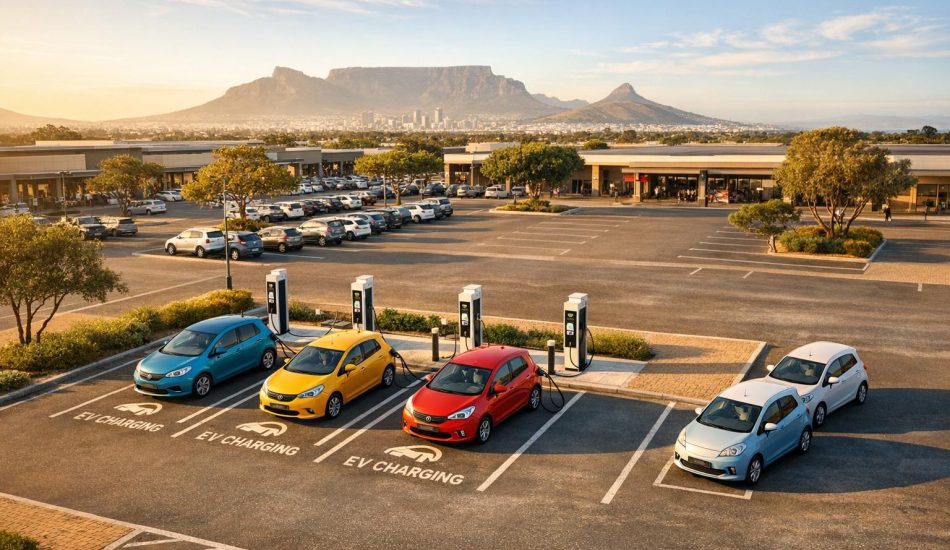
Senegal’s 2025 EV import rules bring major tax breaks and simplified processes, making it easier and cheaper to import electric vehicles (EVs). Here’s what you need to know:
- No VAT or customs duties on 100% electric vehicles.
- Reduced import duties for hybrids and non-electric vehicles.
- Simplified customs procedures and lower penalties for SMEs.
- Required documents include invoices, vehicle titles, and customs forms.
- EV-specific rules include battery safety compliance and VIN labeling.
- Shipping options like RoRo and container shipping vary in cost and protection.
Whether you’re an individual or a business, Senegal’s updated policies and tax exemptions make 2025 a great time to consider EV imports.
New Regulations for 2025
Senegal’s 2025 Finance Act brings a wave of tax reforms aimed at simplifying processes and improving transparency. These updates pave the way for more efficient administration and clearer benefits, especially for businesses and importers.
Updated Policies and Import Benefits
One of the standout changes is the elimination of VAT, customs duties, and internal taxes on fully electric vehicles (EVs). In addition, import duties on traditional, hybrid, and electric vehicles have been reduced progressively. This makes EVs significantly more affordable and accessible.
The government has also abolished registration and conciliation commissions, simplifying tax procedures. Meanwhile, COVID-19-related import measures have been removed, reinstating a stable and predictable import process. For small and medium-sized enterprises (SMEs) not under the DGE (Direction Générale des Impôts et des Domaines), the penalty for non-declaration has dropped from 10 million XOF to just 1 million XOF.
In June 2025, Senegal partnered with Chinese firms to set up an industrial assembly unit for gas and electric buses. The goal? To replace over 40,000 outdated vehicles with 6,000 modern ones within five years. Prime Minister Ousmane Sonko described China as a "natural partner" in modernizing Senegal’s transportation infrastructure. Trade between the two nations hit $4.34 billion in 2022, a 14.8% increase from the previous year. These developments are expected to make the import process smoother and more predictable.
Before 2025 vs. 2025: What Changed
| Aspect | Before 2025 | 2025 Regulations | Impact |
|---|---|---|---|
| VAT on 100% EVs | Standard VAT rates applied | No charges | Lower overall costs |
| Customs Duties on EVs | Standard import duties | No charges for 100% EVs | Easier market entry |
| Internal Taxes | Applied to all vehicle types | Exempted for EVs | Increased affordability |
| Administrative Process | Multiple commissions required | Streamlined procedures | Faster processing times |
| COVID-19 Measures | Exceptional procedures in place | Standard procedures restored | More predictable timelines |
| SME Penalties | 10 million XOF fine for non-compliance | Reduced to 1 million XOF | Lower financial risk for SMEs |
These reforms signal a significant shift in Senegal’s policy on vehicle imports, creating a more business-friendly environment. The tax exemptions, simplified processes, and reduced penalties make 2025 an ideal time for companies to explore opportunities in Senegal’s growing electric vehicle market.
Import Requirements and Required Documents
Getting your documents in order is the first step to ensuring smooth customs clearance and avoiding unnecessary costs when importing an electric vehicle (EV) into Senegal. These guidelines align with Senegal’s 2025 reforms, designed to simplify the import process.
Required Documents Checklist
To successfully import an EV, you’ll need to gather key paperwork that confirms ownership, value, and compliance with local regulations. Here’s what you’ll need:
- Shipping and Commercial Documents:
- A supplier’s commercial invoice showing the vehicle’s purchase price and specifications
- Freight bill outlining your shipping details
- Certificate of origin from the country’s Chamber of Commerce, verifying where the EV was manufactured
- Packing list describing the shipment’s contents
- Insurance certificate covering the shipment
- Vehicle-Specific Documentation:
- Original vehicle title or a certified copy proving ownership
- Vehicle registration document
- For resale purposes, a commercial invoice reflecting the sale
- A government-issued ID (passport or driver’s license) for the owner or shipping agent
- Customs and Regulatory Paperwork:
- Preliminary declaration of import (DPI) for shipments valued at 1,000,000 FCFA (about USD 2,000) or more, filed through a local bank
- Bill of Lading (BOL) from the shipping company
- Combined Certificate of Value and Origin (CCVO) and Senegal Customs "Form C"
- Authorization Documents:
- Power of Attorney (POA) if a third-party agent handles the shipping process
- Taxpayer Identification Number (TIN) for corporate importers
- Authorization for importing goods subject to quotas, if applicable
With all documents prepared, you’re ready to move on to the customs process.
Customs Process and Tax Information
Senegal’s updated customs procedures, introduced in 2025, have made clearance more straightforward, but understanding the steps and costs involved is key to avoiding delays. Once your EV reaches the port, customs clearance typically takes 5–10 business days. During this time, your vehicle will undergo a physical inspection to confirm that all documentation is complete and that the EV meets required safety and environmental standards.
Under the new regulations, 100% electric vehicles are exempt from VAT, customs duties, and internal taxes. This exemption offers considerable savings compared to importing traditional vehicles. However, you should still account for additional fees, such as port charges, broker fees, or processing costs. Confirm these with your logistics provider and retain all receipts for reference.
Additionally, a Cargo Tracking Note (BSC/CTN) is mandatory for all shipments to Senegal. This document, which must be obtained before the vehicle leaves its country of origin, is essential for tracking your shipment through customs.
Electric vehicles also come with their own set of compliance requirements, which go beyond standard customs procedures.
Special Requirements for Electric Vehicles
Importing an EV into Senegal involves meeting specific compliance standards that differ from those for traditional vehicles. Here are the key points to consider:
- Battery Safety Compliance:
Provide a detailed Material Safety Data Sheet (MSDS) for lithium-ion batteries to pass customs safety inspections. - VIN Labeling Requirements:
Ensure the vehicle has a label on the front windshield displaying the Vehicle Identification Number (VIN) and specifying that it’s an electric vehicle. This helps customs officials quickly identify vehicles eligible for tax exemptions. - Import Notification Protocols:
Notify your car transporter and Senegal Customs in advance about your intent to import an electric vehicle. This proactive step can expedite the specialized inspection process. - Age and Condition Restrictions:
Senegal has rules regarding the age and condition of imported vehicles. While exact limits aren’t specified, confirming compliance with local standards is essential. Experienced customs brokers can assist with this verification. - Environmental Compliance Verification:
Your vehicle inspection certificate must confirm that the EV meets Senegal’s environmental standards. This may include emissions testing adapted for electric powertrains.
Allow extra time for inspections and document reviews specific to EVs. For the latest updates on import procedures and compliance standards, reach out to the Senegal Embassy in Washington, DC, or the Senegal Customs Service.
Shipping, Logistics, and Compliance Tips
After gathering all the necessary documents, the next big step is choosing the right shipping method and ensuring your electric vehicle (EV) meets all safety requirements during transport. Logistics play a huge role in determining your costs and timeline, so making smart choices here is key to a smooth import process.
Shipping Methods and Cost Breakdown
When importing EVs to Senegal, you’ll typically choose between two main shipping methods: RoRo (Roll-on/Roll-off) and container shipping. Each option has its own pros and cons when it comes to cost, protection, and delivery time. Here’s a quick breakdown to help you decide:
- RoRo Shipping: This is the most economical option for operational EVs. Your vehicle is driven onto the cargo ship and secured in a designated space. While it’s cost-effective, RoRo offers limited protection from external elements.
- Container Shipping: This method provides better protection and is ideal for non-operational EVs or those requiring extra security. You can opt for a shared container to save costs or a full container for maximum security.
| Shipping Method | Cost Range | Vehicle Condition Required | Protection Level | Transit Time |
|---|---|---|---|---|
| RoRo | $1,462 – $1,842 | Must be operational | Limited exposure protection | 2-4 weeks |
| Shared Container | $3,230 – $3,850 | Any condition | Fully enclosed | 3-5 weeks |
| Full Container (20ft) | Starting at $3,850 | Any condition | Maximum security | 3-5 weeks |
| Full Container (40ft) | $5,850 – $6,850 | Any condition | Maximum security | 3-5 weeks |
Shipping times from the U.S. to Dakar generally range from 2 to 6 weeks. Keep in mind, these costs don’t include Senegal’s 58% duty on the CIF (Cost, Insurance, and Freight) value of the vehicle. If you’re importing a non-operational EV from U.S. auto auctions, shared container shipping is often the most practical option.
Meeting Compliance and Safety Standards
Transporting electric vehicles comes with specific safety requirements, especially for lithium-ion batteries, which are classified as hazardous materials under international regulations. Your shipping company should have experience handling these batteries and provide documentation proving they follow all safety protocols.
Additionally, Senegal is working on new EV standards with help from Manufacturing Africa, a UK-based company. As this regulatory framework evolves, ensuring your vehicle meets compliance standards is crucial. Once safety and compliance are addressed, finding the right import agent will help streamline the process.
Choosing Reliable Import Agents
A knowledgeable import agent can make all the difference, helping you avoid unnecessary delays and expenses. Look for agents who are experienced in handling EVs and familiar with both RoRo and container shipping methods. They should offer:
- Real-time tracking: Stay updated on your shipment’s progress from the U.S. port to its arrival in Dakar.
- Transparent pricing: Choose agents who provide clear breakdowns of all costs, including port fees and customs charges.
- Strong partner networks: Established agents work with trusted logistics providers, customs officials, and port authorities in both the U.S. and Senegal, speeding up the entire process.
When comparing agents, request quotes from multiple companies and ask about their experience with EV imports and Senegal’s 2025 import regulations. A good agent will also explain international trade terms like CIF (Cost, Insurance & Freight) and DAP (Delivered at Place) to ensure you fully understand the process.
sbb-itb-99e19e3
Using EV24.africa for Your Import Needs

Navigating the complexities of shipping and compliance can be daunting, but EV24.africa simplifies the entire process. This platform offers a comprehensive solution for importing electric vehicles to all 54 African countries, taking care of everything from sourcing vehicles to delivering them to your doorstep. Let’s dive into what makes EV24.africa stand out: its extensive vehicle selection, full-service import support, and dedicated customer care.
Wide Vehicle Selection and Transparent Pricing
EV24.africa connects you to a broad range of electric vehicles from suppliers in Europe, Asia (with a focus on China), North America, and Japan. Whether you’re looking for certified used cars or brand-new models, the platform offers options across various categories, including passenger and light commercial vehicles. Each listing provides detailed specifications and pricing in US dollars, making it easy to compare options and make informed decisions. For bulk importers, a 40-foot container can hold up to four cars, offering an efficient shipping solution.
Comprehensive Import Support Services
From purchase to delivery, EV24.africa handles every step of the import process. They take care of customs clearance, registration, and import taxes, ensuring compliance with regulations like Senegal’s 2025 standards. Whether you prefer RoRo (roll-on/roll-off) or container shipping, the platform offers flexible options for port-to-port or door-to-door delivery. Real-time tracking keeps you updated on your shipment’s progress, while strict adherence to international commercial terms (Incoterms) ensures that all responsibilities and costs are clearly defined. To make the process even smoother, EV24.africa provides flexible financing options tailored to your needs.
Dedicated Expertise and Customer Support
With a team of over 200 professionals spread across five African countries and partnerships in more than 40 nations, EV24.africa brings local knowledge to the table. Their experts navigate country-specific import regulations, ensuring a seamless experience. The customer support team offers personalized assistance throughout the process, making sure all documentation and compliance requirements are met without hassle.
"As Africa’s most trusted and transparent EV import provider, we ensure that every vehicle – whether it’s a Tesla, BYD, Volkswagen, Changan, Leapmotor, Dongfeng, Citroën, Tata, XPeng, Wuling, Mercedes-Benz, or any other brand – is delivered safely and efficiently to all 54 African countries."
- EV24.africa
Conclusion
Senegal’s 2025 electric vehicle import regulations mark a significant turning point, offering benefits for both individuals and businesses. Starting in 2025, fully electric vehicles will be exempt from VAT and customs duties. On the other hand, traditional vehicles will face a hefty 58% duty on their CIF value. These financial incentives, coupled with the Ministry of the Economy’s planned reduction in import duties, make 2025 a prime moment to explore opportunities in Senegal’s EV market. These changes promise a smoother and more cost-effective import process.
To succeed under the new regulations, staying informed about the updated requirements is critical. The rules include strict standards, such as a ban on vehicles older than 8 years. Ensuring accurate documentation, meeting safety compliance standards, and working with experienced import partners will be key steps for a hassle-free experience.
The financial advantages are hard to ignore. For instance, shipping costs from the Netherlands start at $1,500. When combined with the removal of VAT and customs duties, these savings can amount to thousands of dollars per electric vehicle.
"Senegal is actively embracing sustainable transportation, with a growing focus on electric vehicles (EVs). EV24.africa is committed to facilitating this transition by providing a seamless platform for Senegalese customers to import and purchase high-quality electric cars."
EV24.africa plays a pivotal role in this transformation, offering end-to-end support throughout the import process. Their services include sourcing vehicles from Europe, Asia, North America, and Japan, managing customs clearance, and ensuring compliance with Senegal’s regulations. With a team of over 200 professionals spread across five African nations, EV24.africa combines local expertise with global partnerships to streamline vehicle sourcing. By adhering to international commercial terms like Delivered Duty Paid (DDP) and Free on Board (FOB), and offering flexible shipping options with real-time tracking, the platform ensures a transparent and reliable experience.
Whether you’re an individual purchasing your first EV or a business looking to tap into Senegal’s expanding EV market, the regulatory changes in 2025 create an ideal environment. Partnering with EV24.africa simplifies the entire process – from compliance and documentation to shipping – making it easier and more cost-effective to embrace the future of transportation in Senegal.
FAQs
What are the updated requirements for importing electric vehicles into Senegal in 2025?
To bring an electric vehicle into Senegal in 2025, there are several important steps to follow. First, the vehicle must undergo a technical inspection to confirm it meets local safety and emissions standards. This ensures the car is both roadworthy and aligned with Senegal’s regulations.
You’ll also need to gather all the necessary paperwork for customs clearance. This typically includes proof of ownership and any certifications required by the authorities. Be sure to check the exact documentation needed to avoid delays.
When it comes to costs, updated taxes and tariffs for electric vehicles will apply, so it’s essential to budget for these. Additionally, the vehicle must meet Senegal’s emissions and safety regulations, and authorities should be informed of your import plans ahead of time. On the bright side, there might be tax incentives available to encourage the use of electric vehicles. It’s a good idea to review the most recent policies to see if you qualify for any benefits. Following these guidelines can help make the process as smooth as possible.
How will the 2025 regulations impact the cost of importing electric vehicles compared to gas-powered cars?
The 2025 regulations in Senegal bring changes to import duties for electric vehicles (EVs), alongside tax breaks and incentives aimed at encouraging their adoption. While the upfront import duties for EVs might see an increase, these incentives can help offset costs, potentially making EVs a more budget-friendly choice over time compared to gas-powered cars.
Meanwhile, gas-powered vehicles are subject to higher tariffs and taxes, driving up their overall price. This shift could make EVs not only a greener alternative but also a more financially appealing option under the updated rules.
What makes EV24.africa the best choice for importing electric vehicles to Senegal under the 2025 regulations?
EV24.africa simplifies the process of bringing electric vehicles into Senegal, keeping you informed about the current regulations and any available government incentives. Their expert advice ensures you understand the necessary documentation and compliance requirements, helping you save time and avoid unnecessary hassle.
On top of that, EV24.africa offers logistical support specifically designed for the Senegalese market. From managing taxes to handling shipping and other import-related hurdles, they make the process smoother and more budget-friendly for both individuals and businesses.




